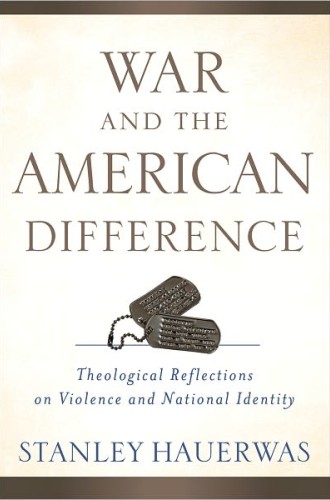America’s altar
My great-great-great grandfather James Arthur Winright died on August 3, 1865, while on his way home from serving in the 152nd Regiment of the Indiana Infantry Volunteers in the Civil War. Fortunately, at least for me, he and his wife already had five children, including my great-great grandfather John Wesley Winright, named after James's older brother, who also fought in the Civil War. Brothers James and John came from LaGrange County in northern Indiana, where their father Babel had settled down and where many nonviolent Amish people now reside.
Writing in the 1890s, E. J. Sherlock described the men of the Indiana Infantry Volunteers as belonging to "that intelligent, sober-minded, brave, strong and intrepid class who left substantial interests, home, kindred and friends, because upon mature deliberation they had determined that their services were demanded of them by their country." That demand upon soldiers of both sides led to the deaths of 8 percent of all white males aged 13 to 43 during the war.
Read our latest issue or browse back issues.
Drawing on Harry S. Stout's Upon the Altar of the Nation: A Moral History of the Civil War, theologian Stanley Hauerwas argues in War and the American Difference that the Civil War became a total, unlimited war because the demand to participate assumed a sacral status: "The sacrifices of those doing the dying and the killing have redemptive purpose and justification." Sacrificial language was ubiquitous at the time, appearing everywhere from Lincoln's Gettysburg Address to Horace Bushnell's assertion in a sermon that the war was "quite literally a blood sacrifice required by God for sinners North and South if they were to inherit their providential destiny."
This sacralization of war did not end with the Civil War. According to Hauerwas, liberal Protestants such as Lyman Abbott and Harry Emerson Fosdick justified World War I as "redemptive for the nation and church," renewing and reinforcing American exceptionalism, which continues to manifest itself to this day—even on Facebook, in a status sometimes posted by my friends and family members about Jesus and the U.S. soldier: "One died for your soul, the other for your freedom."
Such theology has a lot to do with American Christians' failure "to distinguish America's god from the God we worship as Christians." Hauerwas says that Americans devote idolatrous allegiance to freedom—to striving to "live as though we will not die"—because the only thing most of us share in common is our fear of death.
Political leaders refuse to admit policy or strategy mistakes because war is "America's altar," and the deaths of U.S. soldiers are regarded in sacrificial terms. To admit error would be "to betray the sacrifices made by those who . . . died." Thus war for Americans becomes self-justifying. It is a powerful force that "has captured the habits of our imaginations," Hauerwas writes, echoing Chris Hedges and contending that this social imaginary of war is ignored or underestimated by theologians who claim that a posture of nonviolence is unrealistic.
Hauerwas does commend some just war theorists (Joseph Capizzi, David Baer and Oliver O'Donovan) "for trying to recover just war as a theory of statecraft rather than as a checklist to judge whether a particular war satisfies enough of the criteria to be judged just." But he doubts that Americans can "keep the finite finite" and thinks the belief that we can reflects a naive view of international relations. "And pacifists are said to be unrealistic?" he quips.
The alternative to war, Hauerwas contends, is the church, which makes Christ and his peace present in the world. Christ's death and resurrection was "the end of sacrifice," and war has therefore already "been abolished." Hauerwas builds on Daniel M. Bell Jr.'s claim that Jesus is the embodiment of God's reconciling and restorative justice, which in Hauerwas's view is a more scriptural and illuminating understanding of justice than that articulated by Nicholas Wolterstorff. Hauerwas writes that the church, through Christians' participation in Christ's work of justice in the eucharistic liturgy, becomes "God's justice for the world."
In a fascinating chapter on Martin Luther King Jr. and Christian nonviolence, Hauerwas argues that King's willingness to suffer was made possible by deep conviction instilled and nurtured by the black church. Another creative chapter taps the work of Herbert McCabe, who emphasizes communication, with its bodily dimension, as the "paradigm of ethics." McCabe's work leads Hauerwas to suggest that "Pentecost has restored Babel not by mitigating the diversity granted by Babel but by creating a people who have learned how to be patient, how to be at peace, how to listen in a world of impatient violence." In other chapters Hauerwas explores—by engaging Karl Rahner, Alasdair MacIntyre, Rowan Williams and John Howard Yoder—how this kind of community, which is a peaceable alternative to war, is made visible "in its concrete localities" as well as in its "interconnectedness [that] is called 'catholicity.'"
Christians are freed from needing "to secure our existence through sacrificing our and others' lives on the world's altars," Hauerwas writes, and thus they should refuse "to kill one another in the name of lesser loyalties and goods."
Although I agree that America makes a difference in how Americans, including American Christians, wrongly give what Yoder calls a blank check to their nation's warring, I wonder if it's fair to say that all killing is done in the name of flag, freedom, democracy, our way of life and the like. Does the use of lethal force to protect threatened human beings made in the image of God—for example, to stop a genocide that is under way—fall under Hauerwas's indictment?
Hauerwas suggests that C. S. Lewis made little effort to understand pacifism when he was critiquing it, but I worry that Hauerwas, in turn, neglects to give sufficient attention to recent work by Christian just war thinkers. Part of the problem is that his reading of the just war tradition is overdetermined by his engagement with Reinhold Niebuhr. Hauerwas writes, "Realism is used to dismiss pacifism and to underwrite some version of just war." But there are Christian just war thinkers today who don't invoke realism that way, who realistically recognize that most Americans do not really subscribe to just war theory, and who offer a very theological articulation of when and how force may be morally justified in defense of the innocent.
British scholar Adrian Pabst, for example, has written about just war in the context of the Christian belief that "peace is the highest truth." Catholic University of America moral theologian Brian V. Johnstone contends that just war "must be integrated into a life of peace and friendship with God, and with one another," which is "to be embodied in the community of the faithful, and extended to the whole human community by the opus or work of peace." Bell, himself one of Hauerwas's students, has also discussed just war as Christian discipleship, but his book on the topic is mentioned approvingly only in a footnote. Recent thinking understands just war not as a theory of statecraft, but as a politics. The question is whether it's consonant with the politics of Jesus—and I wish Hauerwas had devoted more attention to this in the book.
Of course, for him, as for Yoder, only nonviolence goes "with the grain of the universe." As a student of both, I confess my ongoing wrestling with this, for I think it, ultimately, is the most compelling theological argument to be made for Christian pacifism and against just war. Unlike Hauerwas, I was never a bricklayer, but like him I come from a working-class family. One of my first jobs during high school was at a lumber company's truss plant. As it turns out, wood grain can be straight, spiral or interlocking. Perhaps King was closer to the truth when he said that "the arc of the moral universe is long, but it bends toward justice." If so, then there may be room for today's Christian just war and pacifist interlocutors to interlock in their efforts to promote peace with justice.
In 2002, Hauerwas collaborated with Irish Catholic moral theologian Enda McDonagh to produce the "Appeal to Abolish War," a statement that has not received enough attention. The appeal is reprinted in this book, with reflections in which Hauerwas invites such patient collaboration.
The concluding line of War and the American Difference is taken from a Mennonite Central Committee poster that I recall seeing on Hauerwas's office door: "A modest proposal for peace: Let the Christians of the world agree that they will not kill each other." That poster was also in Yoder's office, and one hangs on my own office door. To help foster such an agreement, let us also agree that we will not neglect each other's strongest arguments.






